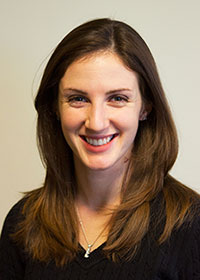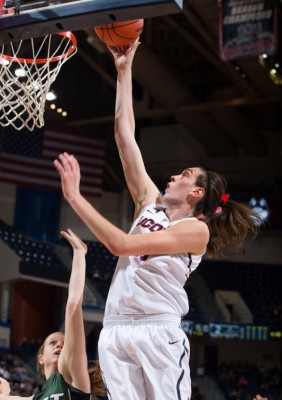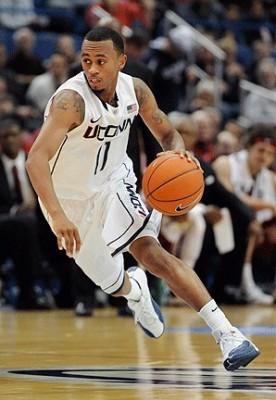The University of Connecticut School of Business will offer a free breakfast seminar for the business community titled, “Long-term Thinking in a Short-term World,’’ from 7:30 to 9:00 a.m. February 24 at the Graduate Business Learning Center, 100 Constitution Plaza, downtown Hartford.Continue Reading
Doctoral Student Margaret Luciano Wins Scholarships for Work on Employee Dynamics in Hospital Patient “Handoffs”

Margaret (“Maggie’’) Luciano, a doctoral candidate at the UConn School of Business, has been awarded two scholarships in recent months recognizing her achievements in the field of organizational behavior.
The Society for Industrial/Organizational Psychology’s (SIOP) Lee Hakel Graduate Student Scholarship recognizes achievement in a graduate career and is intended to assist doctoral students in the field of industrial and organizational psychology with the costs of carrying out their dissertation work. She received the award in January.
It is the second recognition for Luciano, who, late last year also received an award from the Society for Human Resources Management for her dissertation proposal. She was selected as one of four promising researchers.
Her dissertation research focuses on understanding and improving cross-unit coordination between hospital units, and the dynamics between such groups.
She has investigated patient “handoffs’’ as they move from surgery to a recovery room. During baseline assessments, upwards of 20 percent of these handoffs were found to be lacking in one or more important ways, jeopardizing patient care.
“Margaret’s dissertation is a stellar example of cutting-edge applied research,’’ said John Mathieu, professor of management and Luciano’s adviser. “Conceptually, Margaret tests theoretical questions concerning the integration of employees’ individual differences and how they combine to perform interdependent actions. Practically, she devised and implemented a work process improvement which essentially orchestrated how different parties should function during these handoffs.’’
“Her dissertation represented a serious organizational change for the hospital, involving everyone from top management to the nurses and doctors performing the handoffs. Her field experiment revealed that her intervention reduced the percentage of problematic handoffs to approximately 4 to 5 percent—a 75 percent decrease from baseline,’’ Mathieu said.
Both the Society for Human Resource Management (SHRM) and the Society for Industrial/Organizational Psychology (SIOP) awarded her competitive research grants on the basis of her proposed work. The criteria for both awards are that the work should advance both the science of human behavior in organizations, while also advancing practice and human welfare, Mathieu said.
Her research on these and related topics has appeared in the Journal of Applied Psychology and other peer-reviewed journals.
Luciano will join the management faculty at Arizona State University after completing her doctoral program at UConn. She earned her bachelors degree in psychology in 2009 and her MBA in 2010, both from Clark University in Worcester, Mass.
Greater Hartford Accounting Firms Facing Workforce Shortage
Hartford Business Journal – Hartford area accounting firms say they are on a hiring spree to address a region-wide personnel shortage driven by heavy workloads, increased competition for talent, and professional burnout.
While accounting has historically been an in-demand profession, a few changes in recent years have amplified competition among firms and corporations recruiting talent, said Mohamed Hussein, a professor and head of UConn’s accounting department, which graduates over 100 accounting majors per year.
Try Something That Scares You

Every morning, on my way to breakfast in South, I would pass a sign that says “try something that scares you.” I want to go through my days this way. With this idea constantly in my mind, I have decided I need to try new things, hopefully often, to make the most out of my remaining time in college.
When we begin our freshman year, practically everyone is told to make the best of college, and that our time here will go by a lot quicker than we think it will. Even though everyone was telling me that, coming into my freshman year of UConn, I didn’t think that was possible; it was 4 whole years!
But as I am now heading into my final semester as a UConn undergrad Continue Reading
New School of Business Website Offers Easier Navigation, Mobile Access, Other Improvements
After an extensive design review, the UConn School of Business has launched an improved web site (www.business.uconn.edu). Visitors will notice a new content design with streamlined navigation and improved mobile access.
Additional new features include:
- Research-focused section
- Recruiter information
- Details on how to engage or partner with the School
- Expanded pressroom with categorized news items
- Social media directory
- Campus-specific information
The new site will undergo regular upgrades during the upcoming months to maximize the quality of the user experience.
We are excited about our new look and functionality, and hope you will be as well.
All visitors are welcome to report any feedback or concerns to our web development team. Please feel free to contact the Office of Communications at communications@business.uconn.edu.
Builders See Promise in Homes for the Aging Set
ctpost.com – “The over-55 group needs to sell their current homes before they can think about buying into an over-55 community, so I see the market for existing homes as an indicator as to the future of over-55 home construction,” said Katherine Pancak, professor-in-residence of finance and real estate at the University of Connecticut School of Business.
Biotech and Biopharma Industry Get Boost from Business Community
CT News Junkie – The new [Connecticut Bioscience Growth Council] is forming at a time when bioscience is gaining momentum in the state, said Fred Carstensen, director of the Connecticut Center for Economic Analysis at the University of Connecticut.
UConn Women’s Basketball Game CREW Event
 The Commercial Real Estate Women (CREW) of Connecticut and the Center for Real Estate will host the first annual CREW CT UConn Women’s Basketball Event on Tuesday, February 3, 2015. Students and professionals from CREW will have an opportunity to network at a reception to be held from 5:00 – 7:00 p.m. at McCarter English LLP, 36th Floor, CityPlace, 185 Asylum St., Hartford, Conn.
The Commercial Real Estate Women (CREW) of Connecticut and the Center for Real Estate will host the first annual CREW CT UConn Women’s Basketball Event on Tuesday, February 3, 2015. Students and professionals from CREW will have an opportunity to network at a reception to be held from 5:00 – 7:00 p.m. at McCarter English LLP, 36th Floor, CityPlace, 185 Asylum St., Hartford, Conn.
Following the reception, the UConn Women will take on the Cincinnati Bearcats at the XL Center at 7:00 p.m. Tickets are $26.00 and available through the registration link.
To register for this event and purchase tickets click here.
UConn Men’s Basketball Game
 The 2015 UConn Real Estate Center Alumni & Friends Basketball Event will be held on Sunday, March 1. The Real Estate Center Council will host a pre-game brunch and reception at 12:00 p.m. at the Hilton Hotel’s Connecticut Ballroom, 315 Trumbull Street, Hartford, Conn.
The 2015 UConn Real Estate Center Alumni & Friends Basketball Event will be held on Sunday, March 1. The Real Estate Center Council will host a pre-game brunch and reception at 12:00 p.m. at the Hilton Hotel’s Connecticut Ballroom, 315 Trumbull Street, Hartford, Conn.
Following the reception, the UConn Men will play the Southern Methodist University Mustangs at 2:00 p.m. at the XL Center. Tickets are $36.00 and are available through the registration link below.
To register for this event and purchase tickets click here.
REFA Student Field Trip
The Fairfield/Westchester Chapter of REFA will be hosting students from UConn’s Center for Real Estate on February 26 at the UConn Stamford branch to introduce students to the different sectors of the commercial real estate industry. Professionals from the REFA membership will include: Ernest DesRochers and Deanna Polizzo of Northmarq Capital to discuss Mortgage brokerage; Jeff Gage of CBRE and Al Mirin of Cushman & Wakefield to discuss Leasing Brokerage/Capital Markets Brokerage; Brian Heelan of the Ashforth Company and Bob Hartt of Hartt Realty Advisors to discuss Asset Management and In-House Leasing; George Yerrall of RiverOak Investment Corp and David Genovese of Baywater Properties to discuss Development and Investing; and James Lane of Webster Bank and Bob Palermo of Bankwell to discuss Banking.
These roundtable discussions will take place from 12 pm to 5:30 pm and will be followed by a social from 5:30 pm to 7 pm, allowing the students additional time to network with REFA members. The event will take place at the UConn campus on Broad Street in Stamford.